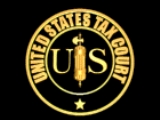
Davis v. Commissioner
Encyclopedia
Davis v. Commissioner, 119 T.C. 1 (2002), was a United States Tax Court
decision which closed the door on a potential loophole with regard to annuities and capital gains tax. The case affirmed that annual lottery annuities cannot be assigned and sold as capital assets.
's Super Lotto Plus game. As a result, Davis became entitled to receive $679,000 as yearly annuity, in 20 payments. (The game did not yet offer a lump sum
option.)
Normally, income derived from annuities are taxed as ordinary income. In 1997, in an apparent attempt to circumvent this tax treatment, Davis entered into an agreement with Singer Asset Finance Company, LLC (Singer). The agreement called for Davis to assign a portion of his right to these annual payments to Singer, in exchange for a single payment of $1,040,000.
In his 1997 income tax return, Davis reported the assignment as a sale of capital asset held for more than one year with a cost basis of $7,009 (representing the cost of attorney's fees). Thus, Davis claimed a long term capital gain
of $1,032,991. By claiming this sum as a capital gain and not ordinary income, this figure was entitled to preferential tax treatment. The Commissioner of the IRS determined this amount to be ordinary income because rights to lottery annuity payments are not capital assets under the provisions of the Internal Revenue Code.
ordinary income or capital gain?
effectively overruled a line of cases which had previously precluded taxpayers from characterizing the right to receive future annual lottery payments as a capital asset within the meaning of section 1221.
United States Tax Court
The United States Tax Court is a federal trial court of record established by Congress under Article I of the U.S. Constitution, section 8 of which provides that the Congress has the power to "constitute Tribunals inferior to the supreme Court"...
decision which closed the door on a potential loophole with regard to annuities and capital gains tax. The case affirmed that annual lottery annuities cannot be assigned and sold as capital assets.
Facts
In 1991, James F. Davis won $13,580,000 in the California State LotteryCalifornia State Lottery
The California State Lottery, also known as the California Lottery, began on November 6, 1984, after California voters passed Proposition 37, the California State Lottery Act of 1984, authorizing the creation of a lottery...
's Super Lotto Plus game. As a result, Davis became entitled to receive $679,000 as yearly annuity, in 20 payments. (The game did not yet offer a lump sum
Present value
Present value, also known as present discounted value, is the value on a given date of a future payment or series of future payments, discounted to reflect the time value of money and other factors such as investment risk...
option.)
Normally, income derived from annuities are taxed as ordinary income. In 1997, in an apparent attempt to circumvent this tax treatment, Davis entered into an agreement with Singer Asset Finance Company, LLC (Singer). The agreement called for Davis to assign a portion of his right to these annual payments to Singer, in exchange for a single payment of $1,040,000.
In his 1997 income tax return, Davis reported the assignment as a sale of capital asset held for more than one year with a cost basis of $7,009 (representing the cost of attorney's fees). Thus, Davis claimed a long term capital gain
Capital gain
A capital gain is a profit that results from investments into a capital asset, such as stocks, bonds or real estate, which exceeds the purchase price. It is the difference between a higher selling price and a lower purchase price, resulting in a financial gain for the investor...
of $1,032,991. By claiming this sum as a capital gain and not ordinary income, this figure was entitled to preferential tax treatment. The Commissioner of the IRS determined this amount to be ordinary income because rights to lottery annuity payments are not capital assets under the provisions of the Internal Revenue Code.
Issue
Was the amount Davis received in exchange for his rights to receive a portion of future annual lottery paymentsordinary income or capital gain?
Holding
The Tax Court held that the right to receive future annual lottery payments does not fit the definition a capital asset per Internal Revenue Code (I.R.C.) § 1221, and therefore the $1,040,000 that petitioners received from Singer was ordinary income, and not capital gain.Reasoning
The court rejected Davis's argument that Arkansas Best Corporation v. CommissionerArkansas Best Corporation v. Commissioner
Arkansas Best Corporation v. Commissioner, 485 U.S. 212 , is a United States Supreme Court decision that helps taxpayers classify whether or not the sale of an asset is an ordinary or capital gain or loss for income tax purposes.- Facts :...
effectively overruled a line of cases which had previously precluded taxpayers from characterizing the right to receive future annual lottery payments as a capital asset within the meaning of section 1221.

